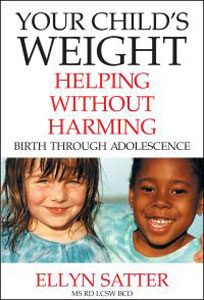

Family Meals Focus
The Ellyn Satter Institute Newsletter
Talking with your child about weight
by Ellyn Satter, Family Therapist and Registered Dietitian
Accept your child just the way he is, but be ready to answer his question when he wonders, “Am I fat?” Find out why he wants to know, and be honest and matter-of-fact with your answer. Settle down, stow your guilt, and help him deal with teasing. Follow the division of responsibility in feeding, and trust him to grow up to get the body that is right for him.
Some children are just naturally big
Five-year-old Logan came home from school with the dreaded question. “Am I fat?” he asked his mother. In following the division of responsibility in feeding, his parents were already protecting him from worry about eating, moving, and weight. But in our fat-phobic culture, that still leaves them with helping him protect himself. Logan was big – his body mass index (BMI) was at about the 97th percentile, and he had a double chin and a roll of fat around his middle. But he was growing consistently, and his parents were doing an excellent job ensuring that that continued to be the case. They had regular meals and scheduled sit-down snacks. They kept a firm hand on the television remote control and regularly gave Logan opportunities to run and play. Logan, in fact, was an active child and could keep up with the other children in vigorous play. “You would think he would run some of that off,” said his parents wistfully.
Ask questions first
Despite Logan’s electrifying inquiry, his mother kept her cool – to a point. “Why do you ask?” she responded. “We were weighed today in school, and they said my BMI was too high,” he said. “And the other kids teased me – they said I was fat.” At first, Logan’s mother was just mad. How could they do that to him? She made a mental note to go to the school and have a few well-chosen words with the principal. But first things first – she had a question to answer. She got a grip as much as she could on her own upset and did the best she could to be kind and supportive. “Well, no, you aren’t too fat,” she said. “You are just stocky. You have always been that way.” It wasn’t perfect, but it was a good first try. To give her full credit, she avoided saying “Well, we’ll just get you thin, and then they won’t say that.” That would have been hurtful and ridiculous. Hurtful because essentially she would have been saying “You are fat, and that is bad. You are not all right the way you are.” Ridiculous because there was no way she could deliver on an intention to “get you thin,” and trying would only have caused them all a world of hurt.
Fat is not a four-letter word
Say this: “Why yes, you are sort of fat. Why do they tease you about that?” There is no mild or harmless term that will get you around this question. Chubby is a word that children know full well to mean “fat.” So are stocky, chunky, solid, or even buff.
Say this: “Why yes, you are sort of fat. Why do they tease you about that?” There is no mild or harmless term that will get you around this question. Chubby is a word that children know full well to mean “fat.” Stocky, chunky, solid, or even buff are words often used by parents and other sympathetic adults to describe the relatively fat child. Those words are appropriate only when used to describe a physically dense child with a lot of muscle mass and bone. For a child who is heavy but not fat, the answer would be, “You are heavier than other children, but you are not fat. You have a lot of muscle and bone.”
It is hard to be matter-of-fact about weight
When you climb down from your alarm at the possibility of answering a child “Well, yes, you are fat,” consider the issues. Logan was looking for information and help. In giving information, his mother was able to neutralize a message that is often used in a derogatory way. He wasn’t expecting his mother to make a value judgment or to protect him from the slings and arrows of the playground. He just wanted to know. How would it have been different if he had asked, “Do I have freckles?” She could easily have said, “Well, yes, you do. Why do you ask?” For that, she wouldn’t feel responsible. For weight, she would. You know how she feels.
Settle down, and stow your guilt
If you, like Logan’s mother, are doing all you responsibly and realistically can to help your child maintain the body that is right for him, then you need to settle down. Stow your guilt and get on with parenting. Guilt simply gets in the way. You don’t have the child you thought you would have or perhaps hoped to have. Your feelings are your problem, not your child’s. Deal with them, and help your child to cope with hers. If you feel apologetic or treat your child as fragile, she will grow up to blame you and be a whiner.
The next step: address teasing
Ask your child, “how does that make you feel when they tease you?” Probably it is sad, bad, or angry. Accept his feelings, and then ask, “Do other kids get teased?” (Yes, and example.) “What do they do about it?” He might not know right off, but your question will start him watching. You are giving him the message that you like him fine the way he is and that you trust him to deal with his problems.
Explore
For help with raising your big child or your small child to feel good about himself and have the body that is right for him, read Ellyn Satter's Your Child’s Weight: Helping Without Harming
Address child weight wisely and well
- Avoid restriction
- Children know how much they need to eat
- Follow the Satter Division of Responsibility in Feeding (sDOR)
- Raise a healthy child who is a joy to feed
- The “overweight” child
- Handout: Your Child's Weight
Related issues of Family Meals Focus
- Child overweight: are current guidelines helpful? do they do harm?
- Children who are obsessed with food
- Court-ordered placement for child obesity: what can you do to help?
- Dieting and mental health
- Do children lose the ability to self-regulate?
- Food restriction in disguise
- Helping without harming with child overweight
- Managing “junk” food AKA sweet, chips, sodas
- Moves and counter-moves with feeding your child
- School nutrition horror stories
- Schools are not weight-loss camps
- Should you control portion sizes?
- Sticky topic of Halloween candy
- Vegetable agenda: Getting children to eat “nutritious” food

